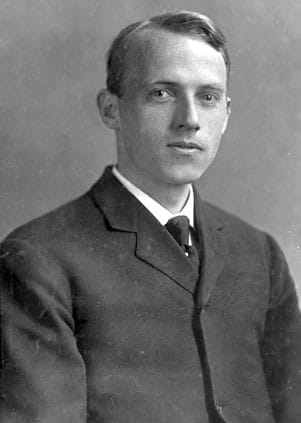 The tenure system allows established professors to pursue research topics without worrying where their results take them. But this system exists, in part, because of one Wharton professor who was found to have gone “too far.”
The tenure system allows established professors to pursue research topics without worrying where their results take them. But this system exists, in part, because of one Wharton professor who was found to have gone “too far.”
Scott Nearing was brilliant, without doubt, influencing generations over his century-long life by advocating what he believed to be a back-to-nature lifestyle of economic and social purity. “If I am rich and you are poor,” Nearing wrote, “both of us are corrupted by inequality.” Nearing matriculated to Penn in 1901, where he was influenced by Simon Nelson Patten (also featured in this issue), the great progressive economist and director of Wharton School from 1896 to 1912. Nearing earned a doctorate in economics in 1909, began teaching sociology at Wharton, and became immersed in progressive social causes in Philadelphia.
Nearing soon became one of the “Wharton Eight,” a group of faculty who believed that they “should make a contribution not only to our students and the University but also to the society at large,” in Nearing’s words. Patten described Nearing as one of Penn’s “most effective men, a man of extraordinary ability, of superlative popularity and a man who, to my mind, exerted the greatest moral force for good in the University.” He also noted that Nearing “had the largest class in the University—there were 400 in his class—and no one could have done his work better.” Thus Nearing was shocked in 1915 when he was the only assistant professor with a favorable recommendation from the faculty not to be rehired. His outspoken views against child labor and other progressive causes had run afoul of Penn’s trustees, who thought he was a dangerous influence on his many followers.
“I do not believe in muzzling any member of the faculty,” said the University Provost. “I do believe, however, that no man may go too far.” Nearing won litigation concerning his dismissal, giving a significant victory to academic freedom—one step toward the creation of the tenure system. By 1917 Nearing was fired from the University of Toledo as an administrator and professor due to his opposition to America’s World War I involvement. In March 1918 he was indicted, but later exonerated by the federal government via the Espionage Act for his antiwar writing.
In the 1920s he joined the Communist party until he was expelled from that organization for being too radically independent. Nearing later espoused a simple lifestyle of abstaining from products and economic practices that he believed hurt society. Among his 50 books was the classic Living the Good Life, co-authored with his wife Helen in 1954 and republished in 1970, inspiring the countercultural movement of the time. Nearing died in 1983 shortly after his 100th birthday.

























